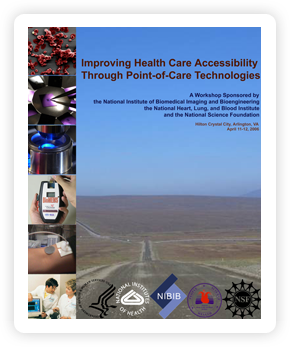Improving Health Care Accessibility Through Point-of-Care Technologies
April 11-12, 2006
Hilton Crystal City
Arlington, Virgina

|
Sponsored by the
National Institute of Biomedical Imaging and Bioengineering (NIH)
National Heart, Lung, and Blood Institute (NIH)
National Science Foundation
|
Welcome to the workshop on "Improving Health Care Accessibility Through Point-of-Care
Technologies." The meeting was jointly sponsored by the National Institutes
of Health (National Institute of Biomedical Imaging and Bioengineering and the National
Heart, Lung, and Blood Institute) and the National Science Foundation. Each of these
sponsoring agencies has an interest in evaluating the potential role that point-of-care
testing can play in addressing many of the Nation's current health care challenges,
including, among others, management of chronic illness, reduction of health care
costs, improvements in accessibility and quality, and provision of care for an aging
population.
As such, the goal of the workshop was to bring together technology developers, clinical
researchers, and clinicians to assess the technological developments required for
advances in point-of-care testing and to identify high-priority clinical problems
that can benefit from a point-of-care approach. The workshop was structured
around a "systems" perspective, both technology-based systems and the
health care system as a whole, to reflect the belief that changing the way health
care is delivered will lead to significant improvements in quality, accessibility,
and cost of services.
The meeting included oral and poster presentation on the state of the science in
relevant technology areas, including sensors and lab-on-a-chip devices, non-invasive
and minimally-invasive patient monitoring, low-cost imaging, health informatics,
and telehealth. In addition, leading clinicians and clinical researchers provided
insight into pressing clinical needs in health care settings with the potential
for greatest impact on accessibility, specifically primary care, emergency medical
services, home health care, and developing countries. Industry representatives addressed
broadly their perspectives on the barriers to commercialization of point-of-care
technologies and the challenges and opportunities associated with working at the
technology/clinical interface. The meeting closed with a discussion of the role
of evidence in policy decisions and with a summary of community recommendations
for advancing the field of point-of-care testing. Final recommendations will
be available here in the future.
NOTE: To open PDFs on this page, download and install the free Adobe Acrobat Reader.
Last Updated On 01/05/2010